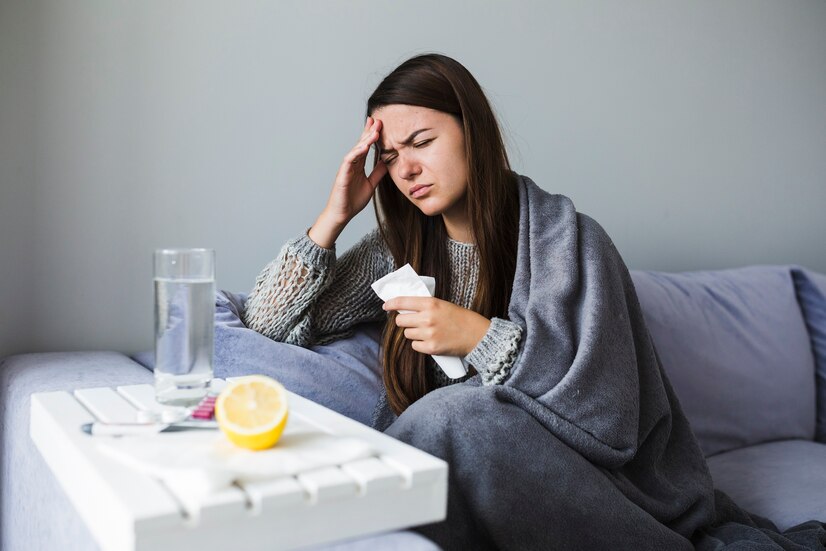Pneumonia. The very word conjures up images of hacking coughs, feverish chills, and lungs struggling for air. While it’s a serious condition, knowledge is power, and understanding this respiratory foe can equip you to face it head-on. This blog is your guide to navigating the world of pneumonia, from recognizing its sneaky symptoms to exploring treatment options and vital prevention strategies. Buckle up, and let’s take a deep breath together!
Pneumonia’s Unwelcomed Guests: Recognizing the Symptoms
Imagine a battlefield in your lungs. Tiny invaders called bacteria, viruses, or even fungi wreak havoc, inflaming your air sacs and making breathing a chore. That’s pneumonia in a nutshell. But how do you know those uninvited guests have set up camp in your respiratory system?
- The Cough that Won’t Quit: A persistent, wet or dry cough is a hallmark symptom. Think of it as your lungs’ alarm system, blaring to get rid of the irritants.
- Feverish Frenzy: Feeling like you’re roasting from the inside out? A fever, often accompanied by chills, is another common sign.
- Sharp Shallows: Taking a shallow breath hurts? Pneumonia can make your lungs feel tender, leading to chest pain with every gasp.
- Rapid Respiration: Your body goes into overdrive trying to compensate for the oxygen shortage, making you breathe faster and shallower.
- Other Suspects: Fatigue, muscle aches, loss of appetite, and even confusion can be additional clues hinting at pneumonia’s presence.
Remember, if you experience any of these symptoms, especially a combination of them, don’t wait for the battle to escalate. Seek medical attention promptly. Early diagnosis and intervention are crucial for a swift recovery.
Taming the Tide: Treatment Options for Pneumonia
Once the diagnosis is confirmed, your doctor will tailor a treatment plan based on the type and severity of your pneumonia. Here are some of the weapons in your doctor’s arsenal:
- Antibiotics: For bacterial pneumonia, these soldiers target the invading bacteria, quelling their rebellion and paving the way for healing.
- Antivirals: If a viral strain is the culprit, your doctor might prescribe antivirals to weaken the virus and shorten the duration of your illness.
- Rest and Recuperation: This might sound simple, but getting plenty of rest allows your body to focus its energy on fighting the infection. Think of it as sending in reinforcements!
- Pain Management: Medication can help ease the discomfort of fever, chest pain, and cough, making the battle against pneumonia a little less painful.
- Oxygen Therapy: In severe cases, supplemental oxygen can provide the much-needed boost your lungs need to function properly.
Real-Life Warriors: Overcoming Pneumonia with Courage and Care
Remember Sarah, the 70-year-old grandmother who contracted pneumonia after a bad cold? With prompt diagnosis and a tailored treatment plan, she received antibiotics, managed her fever and cough with medication, and prioritized rest. Her supportive family provided emotional encouragement, and after a week of battling the infection, Sarah emerged victorious, her lungs healed and her spirit resilient.
Sarah’s story is a testament to the power of early intervention, treatment adherence, and a positive attitude. While pneumonia can be daunting, remember, you’re not alone in this fight. You have your doctor, your loved ones, and your own inner strength to guide you through.
Building a Fortress: Prevention Strategies to Keep Pneumonia at Bay
Prevention is always better than cure, and when it comes to pneumonia, a few simple steps can go a long way in keeping those unwanted guests at bay:
- Wash Your Hands: This age-old advice works wonders. Frequent handwashing with soap and water is one of the best ways to prevent the spread of germs that can cause pneumonia.
- Practice Good Hygiene: Coughing and sneezing etiquette matters. Cover your mouth and nose with a tissue or your elbow to prevent the spread of germs.
- Vaccinate Wisely: Get vaccinated against pneumococcus bacteria and influenza virus. These vaccines are your pre-emptive strike, building a strong defense against these common pneumonia-causing agents.
- Strengthen Your Defenses: Eating a healthy diet, exercising regularly, and getting enough sleep all contribute to a strong immune system, your body’s natural army against infections.
- Avoid Smoke and Smokers: Secondhand smoke irritates your lungs and increases your risk of pneumonia. Steer clear of smoky environments and encourage smoke-free zones around you.
Small Steps, Big Impact: Real-Life Prevention in Action
John, a busy businessman, made a conscious effort to wash his hands regularly, especially after being in public places. He also
